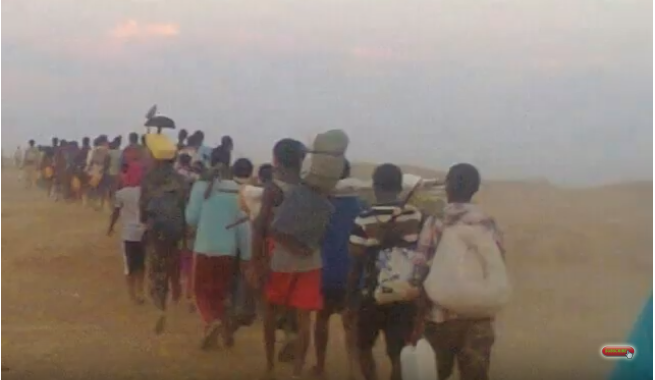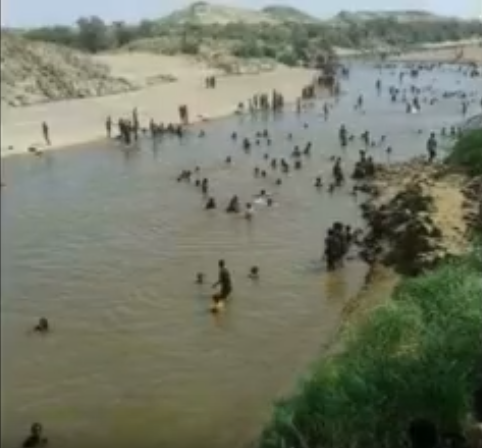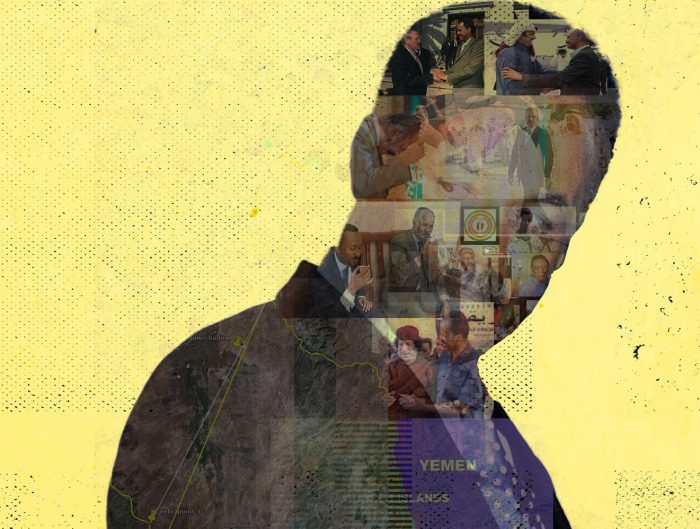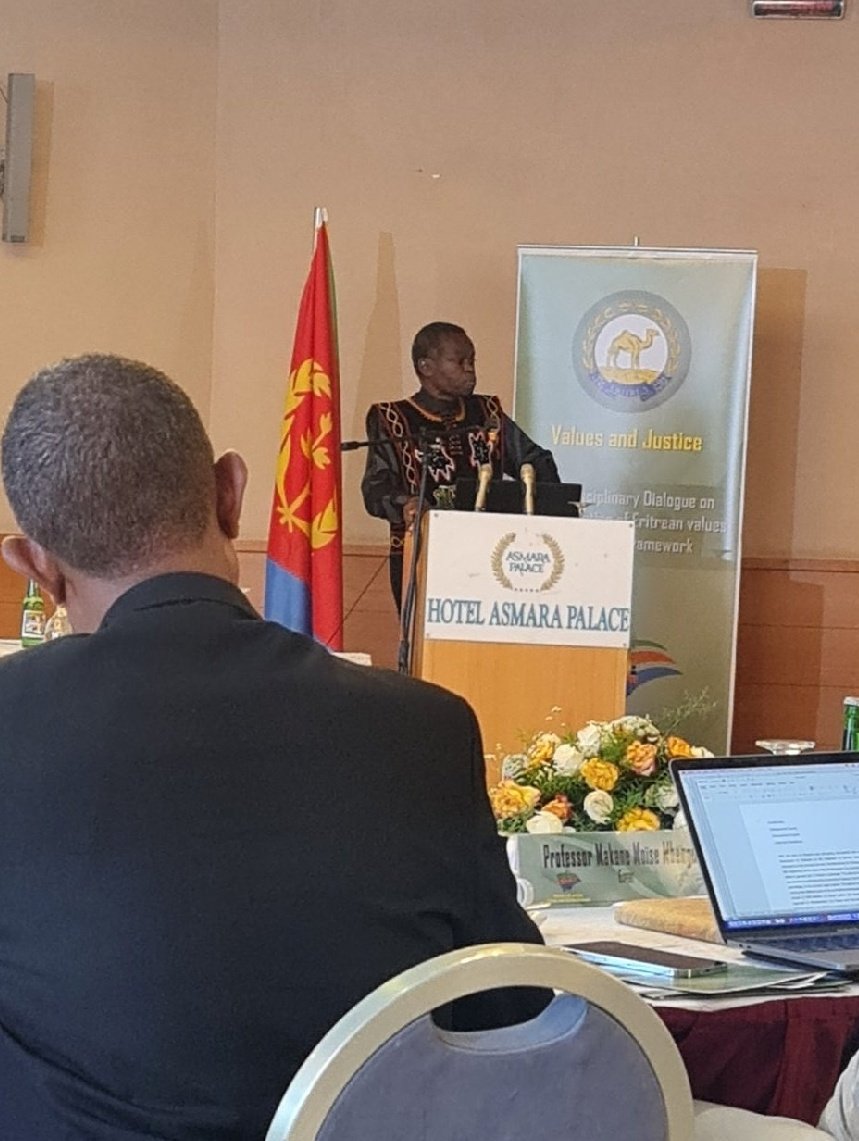This is Part 2 of a translation of a narration in Tigrinya which was made by one of the members of the 26th Round. All errors in translation are that of ED Editor. Sawa recruits are 17-18 years old Eritrean kids: keep that in mind as you read this report. Then maybe you will understand why even underage Eritreans are leaving Eritrea, now, post the peace agreement with Ethiopia: the predator is at home.

Greetings, listeners of RBL TV Entertainment. How’ve you been? I am fine, thanks God. “No problems, and if there are they will be overcome,” was the slogan of my 26th Round comrades; salutations wherever you may be. Since I posted part 1 of my story, those of you who have called me and commented [on the youtube video I shared] have boosted my morale: my heartfelt gratitude to you. I am here to tell you part 2 of “26 Round: A Wound that Won’t Heal.”
Author: Musael Temesgen
Narrator: Yohannes Ahferom (“Fabrigas”)
This new journey was not as bad as the previous one: it was lighter. But our minds were not on the journey, but the death of our brothers, whom we buried in the wilderness. We just couldn’t comprehend it. We spent the day at Amalayt and, that night, many fled.
We woke up at 4:00 in the morning, and prepared for our journey. Life was getting tougher and more challenging. We were very worried about those who fled overnight. Dear Lord, hope we hear no bad news, we said. Because that night, we all knew we were surrounded by hyenas and thus our worries. With no insight on the whereabouts of those who fled overnight, we prepared for our journey.
When we returned to our camp after burying our comrades, nobody could eat or drink. They, particularly those in our Company, asked, “did you really just bury them?” We just nodded our heads “yes.” The Members [Ed: when author says “Members”, he means “Administrators”] said, “all this grief because you buried your comrades? Stop it!” Although the plan was for us to spend the night in Kerkebet, after the accident, they got an order to move us out. We packed our clothes, even the laundry we had just washed, while still moist. That was the 16th: we moved from Kerkebet to Amalayt: a 30-kilometer journey. On the 17th, at 4:40 am, with our mind elsewhere, we started a new march, this time from Amalayt to Kur. After spending the day there, from Kur we began the march to Alayt around 4:00 pm. It was a light 3 1/2 hour journey. But for those not familiar with long walks, it was hard on them. The females boosted their morales by telling them they can do it.
It was on the 18th when we initiated the march from Kur to Alayt. This was around 4:30 pm. We arrived at Alayt at night at 10:20 pm. This journey was similar to the one we took to Af-Himbol. My apologies: I forgot in Part 1, that the first leg of our journey was from Sawa to Af-Himbol. It was a bitter march that tried everybody’s patience. That’s where many of the females and some males started falling. You lift up and carry them, notwithstanding how tired you are. If you are lucky, a car may pick them up.
Oh our mutual concern, fraternity, love! Even when they could barely walk, some of the girls would reject our offer to help and say, “no, I will just walk slowly.” Ah, the kindness! The concern! Do we deserve this misfortune?
Six hours and fifty minutes later, we arrived at Adayt. Everybody had blisters on their feet. As for me, the fatigue from the journey, carrying some of my female comrades, and a toothache I had: I couldn’t even carry my bag anymore. Same with my comrades: but it was not their choice. There is nothing that can be done.
After we spent the day at Adayt, the Members, as usual, started annoying us with “Get ready; move it!” Nobody could handle the pain, the bitterness, the agony: we just stared at one another and froze. But there is nothing you can do besides grumbling. When told to move it, you move.
On the 19th, at 5:20 pm, we initiated the march to Hrum. We arrived at Hrum at 10:00 pm. This, too, was a very tiring journey. This was a bad trail covered in dust storms. If you recall, the visibility was so poor you could barely see who was ahead of you. It was so dusty. It took us 4 hours and 40 minutes.
At Hrum, someone from the 25th Round stumbled and fell, and injured his legs badly. A girl, who knows what stung her, had severe pain in her hand. At 2:00 am, we took them both to the First Aid mobile unit traveling with us. We spent the night at Hrum.
On the 20th, at 5:00 am, we started the march from Hrum to Zara. The fatigue and hopelessness all contributed to making even the boys cry. But this march was not as we feared: it was okay. What is discouraging is not knowing how long we will march and when we will rest. We arrived at Zara at 7:00 am.
At Zara, we were told we would rest for three days. This boosted our morale. We started building our shelter that would last 3 days, using the sheets we were given. Zara was fine: when the soldiers and businessmen heard of our arrival, they came bearing wares: to sell us groceries. Those with means even went to Zara town to entertain themselves. The people hosted us well; we bought groceries, bathed and washed our clothes. We chipped in, bought goats and had meat for a meal. But the Members who did not like our happiness or comfort passed a directive that nobody can go to Zara town. Because, they said, some drank too heavily and some absconded. And so the Members took 3 members from each Company and did the shopping for us. The youth became more care-free: we roamed around the battalions to inquire about one another. What I recall and makes me laugh is us chasing rabbits, being told to stop and ignoring the orders. When we were frustrated that our hunt was futile, we came upon a rabbit that was exhausted from the hunt by another Company: we surrounded and caught it. We made a hurried meal out of it.
All the exhaustion was forgotten. This tells you how good our people are: how easily indemnified by the trivial! Knowing this nature of ours, they had no problem exploiting it. The rest at Zara was very sweet. That’s where comrades got to know one another more deeply.
The days of rest, the 21st, 22nd, 23rd, turned their backs on us. In the morning of the 23rd, perhaps because it dawned on us that rest time was over, we began to slow down our activities. Because we started recalling the long march we took. We asked the residents of Zara, “how long is the distance from here to Afabet?” We got different answers. Some said it is close by and others said it is very far: “you have a two-weeks journey” is the bad news they gave us. We got tired before we started the journey. You lose hope. But it was time to initiate the march.
It was time. And now again we were told some people from our Company had escaped. Around 4 pm on the 24th, we began the journey from Zara to Asmat. It appeared we were changing directions. Whereas, so far, we had been moving Northeast, now we would be moving Southeast. After a long journey by the banks of a river, we arrived at Asmat. We had travelled for 8 hours.
We spent the night at Asmat. Some of the residents of the area escaped overnight. On the 25th, at 4:20 am, we initiated the march from Asmat to Shigalet. This was the longest march: we traveled for eight hours and 40 minutes without rest. In addition to the fatigue, all of us had blisters. The trail was sandy and thus added to the exhaustion. For me, this long journey was not only exhausting but my toothache was worsened. But all is reachable and I arrived at the destination with my comrades.
The river bed at Shigalet had some water: we bathed and washed our clothes. At 3:30 pm, it was time to march again: this time from Shigalet to Qerxet. The fact that the march started earlier hinted at the bitterness that would follow: there were rumors it would be tough. Given my blisters and toothache, I asked permission to board the vehicle with some of our female comrades. What is sad is you are told that from each Company, only a maximum of three are allowed to get on the car. If five get sick, you must help two of them walk with you. Although cars are better than walking they are not comfortable because you are packed like beans in a pot. Although they could see I was sick, my request was denied. Now I didn’t know what to do. A female member of my Company had leg cramps and after I accompanied her to the car, I sneaked in.
The car began the journey before those on foot; a Member who couldn’t find me kept calling my name and heading to the car. My female sisters hid me with their belongings. They took responsibility and said, “he is not with us.” The vile Member didn’t believe them and searched the car but couldn’t find me. What a relief: the car started its journey.

The dirt road was new, dusty and winding. It made its way uphill, up a pass, and we arrived at 10:00 pm. We were met with a very cold weather. Not hard to understand the contrast between the hot weather of the lowland and cold weather of the highland. Well, the cold presents no problems except pain. I kept thinking how will those on foot climb the journey I took in a car? They showed up, stumbling along, at 7:30 am. That they were all scattered told me that the journey was hard. I knew a severe punishment awaited me. When I saw that even the veteran Members were beyond exhausted, I understood how hard the journey was. I had seen the punishment that befell those who had sneaked in to a car: sticks landed on them as if they were animals. My turn was coming and I awaited it.
My comrades started consoling me: nothing is worse than what we just undertook, even if they imprison you for a week. The first one that met me is the Company leader: why did you do that, he asked, as he insulted me. But he felt sorry for me and didn’t turn me over: he just told the platoon leader that I was accounted for. But he got his orders. I had a shawl given to me by one of our sisters to comfort my toothache; he used it to bind me. The platoon and company leader gave me my one and final warning. They tied me overnight and freed me in the morning and then I was told that the journey they took on foot is difficult to explain. Climbing the steep hill required the one on higher plane pulling up the one on the lower plane, on rotation. Every single female member fell. What took us six hours took them 3 hours and 40 minutes (Ed: obviously a mistake). Never mind walking it, hearing the story of the steep climb is terrifying. The scratches from branches on their bodies are a testimony to it: God saved them, otherwise, a girl had almost fell off the cliff. The comrades went to look for her and found her clambering her way. When I heard this news, I knew my punishment–helicopter for four hours–was nothing.
On the 27th, at 3:00 pm, we began the march from Qerxet to Aretay. Qerxet is so high up, just as my comrades found it challenging to climb up, I found it challenging to climb down. It was steep and slippery and we could barely walk. A narrow trail, one misstep and you are done. Some of the other brigades had taken a wrong path and ended up ahead of us: we met at the river bank. Until they could pass, we rested a bit. On this leg of the trip, Division Commander Merhawi joined us and witnessed all our hardship. We wondered if he would find a remedy for us. What remedy? How cold the weather was at the river bank! Everybody was trembling.
We arrived at Aretay at night. We spent the night there.
On the morning of the 28th, we marched for two hours from Aretay. The vehicles carrying supplies like water could not make it through. Because there was no path, they traveled via Keren to Afabet. Supplies were routed via camels and followed us.
On the morning of 29th, we had a light march from Aretay to Habero for two hours. We spent the night there.
On the 30th, at 4:00 am, we marched from Habero Xelim to Habero XaEda for five hours and ten minutes: a heavy walk. Some of our comrades were from Habero and visited their families; the rest bought supplies from there. That night, we saw the lights of Afabet. We were now hopeful. And we spent the night at Habero.
At 4:00 am the next day, we traveled for 3 hours and arrived at Aidab, in the environs of Afabet at 8:00 am. The end of the march for the Commando and Machinery Brigades was at Aidab; for the Agriculture and Officers Brigades it was Roba Heday.
When we were told, “this was your march, thus ends your journey”, we behaved as if we brought about independence: we jumped around and hugged one another. Some cried in joy. What seemed like a never-ending journey, well, we buried our comrades, we carried our ailing, supported our limping and concluded it in peace. We moved around to inquire about those whom we knew.
After a few days, we gathered for a meeting. We were given an assessment of our journey from Sawa to Afabet. We had traveled for 327 kilometers. We had marched for 80 hours.
Part 3 continues





Leave A Reply